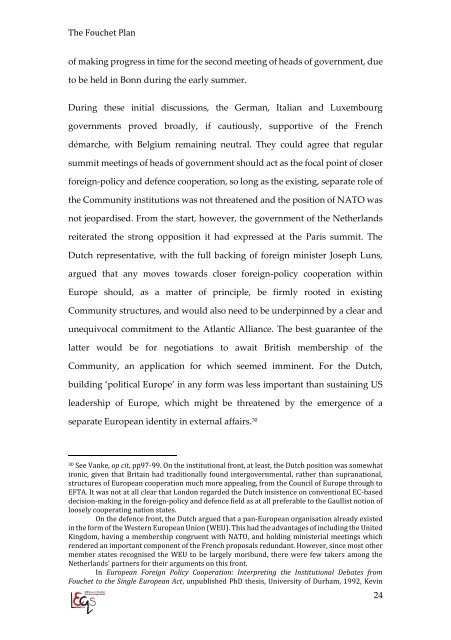The Fouchet Plan De Gaulle’s Intergovernmental Design for Europe
n?u=RePEc:eiq:eileqs:117&r=cdm
n?u=RePEc:eiq:eileqs:117&r=cdm
Create successful ePaper yourself
Turn your PDF publications into a flip-book with our unique Google optimized e-Paper software.
<strong>The</strong> <strong>Fouchet</strong> <strong>Plan</strong><br />
of making progress in time <strong>for</strong> the second meeting of heads of government, due<br />
to be held in Bonn during the early summer.<br />
During these initial discussions, the German, Italian and Luxembourg<br />
governments proved broadly, if cautiously, supportive of the French<br />
démarche, with Belgium remaining neutral. <strong>The</strong>y could agree that regular<br />
summit meetings of heads of government should act as the focal point of closer<br />
<strong>for</strong>eign-policy and defence cooperation, so long as the existing, separate role of<br />
the Community institutions was not threatened and the position of NATO was<br />
not jeopardised. From the start, however, the government of the Netherlands<br />
reiterated the strong opposition it had expressed at the Paris summit. <strong>The</strong><br />
Dutch representative, with the full backing of <strong>for</strong>eign minister Joseph Luns,<br />
argued that any moves towards closer <strong>for</strong>eign-policy cooperation within<br />
<strong>Europe</strong> should, as a matter of principle, be firmly rooted in existing<br />
Community structures, and would also need to be underpinned by a clear and<br />
unequivocal commitment to the Atlantic Alliance. <strong>The</strong> best guarantee of the<br />
latter would be <strong>for</strong> negotiations to await British membership of the<br />
Community, an application <strong>for</strong> which seemed imminent. For the Dutch,<br />
building ‘political <strong>Europe</strong>’ in any <strong>for</strong>m was less important than sustaining US<br />
leadership of <strong>Europe</strong>, which might be threatened by the emergence of a<br />
separate <strong>Europe</strong>an identity in external affairs. 30<br />
30 See Vanke, op cit, pp97-99. On the institutional front, at least, the Dutch position was somewhat<br />
ironic, given that Britain had traditionally found intergovernmental, rather than supranational,<br />
structures of <strong>Europe</strong>an cooperation much more appealing, from the Council of <strong>Europe</strong> through to<br />
EFTA. It was not at all clear that London regarded the Dutch insistence on conventional EC-based<br />
decision-making in the <strong>for</strong>eign-policy and defence field as at all preferable to the Gaullist notion of<br />
loosely cooperating nation states.<br />
On the defence front, the Dutch argued that a pan-<strong>Europe</strong>an organisation already existed<br />
in the <strong>for</strong>m of the Western <strong>Europe</strong>an Union (WEU). This had the advantages of including the United<br />
Kingdom, having a membership congruent with NATO, and holding ministerial meetings which<br />
rendered an important component of the French proposals redundant. However, since most other<br />
member states recognised the WEU to be largely moribund, there were few takers among the<br />
Netherlands’ partners <strong>for</strong> their arguments on this front.<br />
In <strong>Europe</strong>an Foreign Policy Cooperation: Interpreting the Institutional <strong>De</strong>bates from<br />
<strong>Fouchet</strong> to the Single <strong>Europe</strong>an Act, unpublished PhD thesis, University of Durham, 1992, Kevin<br />
24


